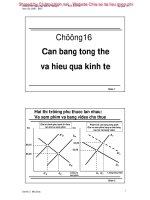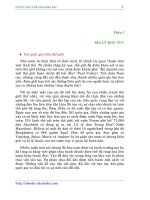Aurora the magnificent
Bạn đang xem bản rút gọn của tài liệu. Xem và tải ngay bản đầy đủ của tài liệu tại đây (1.24 MB, 292 trang )
TheProjectGutenbergEBookofAuroratheMagnificent,byGertrudeHall
ThiseBookisfortheuseofanyoneanywhereatnocostandwith
almostnorestrictionswhatsoever.Youmaycopyit,giveitawayor
re-useitunderthetermsoftheProjectGutenbergLicenseincluded
withthiseBookoronlineatwww.gutenberg.net
Title:AuroratheMagnificent
Author:GertrudeHall
ReleaseDate:December10,2009[EBook#30642]
Language:English
***STARTOFTHISPROJECTGUTENBERGEBOOKAURORATHEMAGNIFICENT***
ProducedbyRogerFrankandtheOnlineDistributed
ProofreadingTeamat
Aloneinherroomlater...shelookedattheotherportrait
AURORA
THEMAGNIFICENT
BY
GERTRUDEHALL
AUTHOROF“THETRUTHABOUTCAMILLA,”
“THEUNKNOWNQUANTITY,”ETC.
ILLUSTRATEDBY
GERALDLEAKE
NEWYORK
THECENTURYCO.
1917
Copyright,1916,1917,by
TheCenturyCo.
Published,March,1917
TO
MYSISTERGRACE
WITHOUTWHOMTHISBOOK
WOULDNOTHAVEBEEN.
ANDTO
MYDEARHELENR─,
WITHOUTWHOMITWOULD
HAVEBEEN
DIFFERENT
LISTOFILLUSTRATIONS
Aloneinherroomlater...shelookedattheotherportrait
Frontispiece
FACINGPAGE
Afteritshestillstoodamoment,lookingtowardthesanctuary
“Ithought,”saidMrs.Hawthorne,“thatyouweregoingtocome
andtakeussight-seeing“
Aurora,claspingherhandsinadelightthatcouldfindnowords
toexpressit,madeasoundlikethecooofadove
Geraldturned,andbeheldthatlady
Aurora’seyes,fixedandstarry,resteduponthelittleflame
Aurora,withacomedyofpride,threwupherchin,liftedher
arms,andturnedasifonapivot
“Come,letusreasontogether,Aurora”
20
82
200
272
290
316
384
AURORATHEMAGNIFICENT
AURORA
THEMAGNIFICENT
3
CHAPTERI
Near sunset, one day in early October, not too long ago for some of us to
remember with distinctness, Mr. Foss, United States consul at Florence, Italy,
tookacab,asonotherdays,tothePortaRomana.Here,wheretheout-of-town
tariffcomesintoeffect,hepaidhisman,andsetouttowalktherestoftheway,
thusmeetingthevariousneedshefelt:thatforeconomy,–hewasafamilyman
with daughters to clothe,–that for exercise,–his wife told him he was growing
fat,–and the need in general for an opportunity to think. He had found that
walkingaidedreflection,thatwalkinginbeautifulplacesstartedthespringofapt
andgenerousideas.Thoughinhismodestwayascholar,hewasnotasyetan
author,butFlorencehadinspiredhimwiththedesiretowriteabook.
Justbeyond theRomanGatebeginsthelongVialedeiColli,–Avenueof the
Hills,–which climbs and winds, broad, shady, quiet, between lines of gardens
and villas, occupied largely by foreigners, to the Piazzale, whence
Michelangelo’s boyish colossus gazes with a slight frown across Florence,
outspreadathisfeet.Mr.Foss,ashemountedtheeasygrade,andnotedwitha
likingunabatedafteryearsthepleasantnessofeachhabitationglimpsedthrough
4
iron railings and embowering green, thought how privileged a person should
feel,afterall,whoseaffairsinvolvedresidenceinItaly.
This recognized good fortune had not been properly tasted before another
aspectofthethingpresenteditselfforconsideration....
The consul felt a sigh trying to escape him, and turning from the images
whose obtrusion had called it up from the depths, directed his attention to a
differentsetofsubjects,unwillingatthemomenttobetroubled.
Thegloriesandiniquitiesofthatgreatfamilywhosecannon-balls–orpills?–
adornsomanyofthe’scutcheonsonFlorentinestreet-cornersandpalace-fronts
arewhatheselectedasthethemeforhismeditations,achoicewhichseemsless
oddwhenweknowthathisbook,thelaborandpleasureofhissparehours,was
astudyoftheMedici.
Hehadnotbeenbusymanyminuteswiththeirsupplantedpoliciesandextinct
ambitions beforethesedroppedbackintothepastwhencehehaddrawnthem,
andhismindgaveitselfovertoanexercisemorecuriousthanreconstructinga
deadepoch.Ashortish,stoutishman,withabeginningofbaldnessonhiscrown
and gray in his mustache, was trying by the whole force of a sympathetic
imagination to fit himself into the shoes, occupy the very skin, of a delicate
younggirl,tolookattheworldthroughhereyesandfeellifewithherpulses.
Thus absorbed, he hardly saw the posts of his own carriage gate; he passed
unnoticingbetweenhisflower-beds,uphisstonestepsandcametohimselfonly
when, rubbing the hands he had just washed, he entered the dining-room and
sawhiswife.
“Wherearethegirls?”heaskedevenbeforekissingher,for themost casual
eyemustbeinformedbytheblanklookofthetablethatinsteadofbeinglaidfor
halfadozenasusual,itwaspreparedforameagretwo.
Mrs.Fosswasfondofsittinginthedining-room,whichhadaglassdoorinto
the garden on the side farthest from the road. There she read her book while
waiting for dinnertime and her husband. The good gentleman did not always
come directly home from his office. He had the love of dropping into dim
churches,ofloiteringonbridges,offingeringthejunkinoldshops,buthewas
consideratelyneverlatefordinner.
Mrs. Foss rose to receive her husband’s salutation, and while answering his
question settled herself at the table; for she had caught sight of a domestic
peepinginatthedoortoseeifthemastersweretheretobeserved.
“Leslie and Brenda went to call on the Hunts,” she gave her account, “and
presentlythe Hunts’man camewith anotefrom Mrs.Hunt, asking ifthegirls
could stay to dine and go to the theater. A box had just been sent them. I was
verygladtogivemyconsent.Charliewillprobablybeoneofthepartyandbring
themhome.OrperhapsGerald.Ortheywillbeputinacab.Iwasdelightedof
thediversionforBrenda.”
“Andwhere’sLily?”
“She, too, is off having a good time. Fräulein was invited by some German
friends who were giving a Kinder-sinfonie. Awful things, if you want my
opinion.SheaskedifshemightgoandtakeLily,andthepoorchildwassoeager
about it I thought I would just for once let her sit up late. She has so few
pleasuresofthekind.”
Mrs.Fosshadhelpedthesoup,withaladle,outofatureen.
It was after her husband and she had emptied their soup-plates in
companionablesilencethat,leaningbacktowaitforthenextcourse,sheasked
herregulardailyquestion.
“Well,anythingnew?Anythinginterestingattheconsulate?”
Mr. Foss seemed in good faith to be searching his mind. Then he answered
vaguely:
“No; nothing in particular.” All at once he smiled a smile of remembrance.
“Yes, I saw some Americans to-day.” He nodded, after an interval, with an
appearanceofrelish.“Therealthing.”
“Inwhatway,Jerome?But,firstofall,whowerethey?”
“Waitamoment.Istucktheircardsinmypockettoshowyou.Theycameto
see me at the consulate. No, they are in my other coat. One of them was Mrs.
SomethingHawthorne,theotherMissEstelleSomething.”
“Whatdidtheywant?”
“Everything–quite frankly everything. They have grown tired of their hotel;
they speak nothing but English and don’t know a soul. They came to find out
frommehowtogoaboutgettingahouseandservants,horsesandcarriage.”
“Didtheythinkthatwaspartofaconsul’sduty?”
“They didn’t think. They cast themselves on the breast of a fellowcountryman.Theycaughtataplank.”
“Ahouse,horses.Theyarerich,then.”
“Soonewouldjudge.Oh,yes,they’rerichinajolly,shameless,old-fashioned
Americanway.”
“Well, it’s a nice way.” Mrs. Foss added limitingly: “When they’re also
generous.Onehasnoticed,however,hasn’tone,”–sheseemedonsecondthought
tobetakingbacksomethingofherapproval,–“acertainreticence,asarule,with
regardtothedisplayofwealthinpeopleofanyrealculture?”
“Thesearen’t,mydear.It’sasplainasthatthey’rerich.And,forachange,let
mewhispertoyou,Ifounditpleasant.Notonetiresomewordaboutartdidthey
utterinconnectionwiththis,theirfirst,visittoItaly.”
“Icanseeyoulikedthem,butwhatyouhavesofarsaiddoesn’tentirelyhelp
metoseewhy.RichandignorantAmericans,unfortunately–Alightbreaksupon
me!Theywerepretty!”
A twinkle came into the consul’s eyes, looking over at his wife, as one is
amusedsometimesbyajokeoldandobvious.
His pause before answering seemed filled with an effort to visualize the
personsinquestion.
“Uponmyword,Etta,Icouldn’ttellyou.”Helaughedathisinability.
“Bythattokentheywerenotbeauties,”saidthewife.
“It seems likely you are right. At the same time”–he was still mentally
regarding his visitors–“one would never think of wishing them other than they
are.”
“Describethemifyoucan.Whatagewomen?”
“Mydear,thereagainyouhaveme.Letussaythattheyareintheflowerof
life. One of them, so much I did remark, was rather more blooming than the
other.Perhapsshewasyounger.”
“Themiss?”
“The married one. But perhaps it was only the difference between a rose
and–”hesearched–“letussayabunchofmignonette.Therose–hereIbelieveI
tread safely on the road of description–had of that flower the roundness and
solidity,ifnothingelse.”
“Stout?”
“Wewillcallitwelldeveloped,noblyplanned.Butwhatwouldbethegoodof
tellingyouthecoloroftheseladies’hairandeyeshadInoticedit?Itwillhelp
youmuchmoreeffectivelytopickthemoutinacrowdtobetoldtheyarevery
American.”
“Voices,too,Isuppose.”
“Ofcourse.Youdon’tstrictlymeanhighandnasal,doyou?AllIcansaywith
anypositivenessisthatoneofthemhadwhatIwillcallawarmvoice–avoice,
tomakemymeaningquiteclear,likethecrimsonheartonavalentine.”
“Iamenlightened.Wasitthemignonetteone?”
“No;thehardy-gardenrose.”
“Andwhatdidshesaytoyouinherwarmcrimsonvoice?”
“Ihavetoldyou.Shecalledforhelp.”
“Yousaid,Ihope,thatyourwifeanddaughterswouldbeveryhappytocall
onthemandbeofuseiftheycould.”
“Idid.”
Thetime-tried,well-matedfriendswerelookingoverateachotheracrossthe
table,notexpressinganymorethanatalltimesthequiet,dailydesireofeachto
furthertheinterestsandcomfortsoftheother.
“Wherearetheystaying?”theladycontinuedtoquestion.
“HôteldelaPaix.”
“Andtheyhaven’tanyletters,introductions,addresses,anything?”
“Apparentlynot.”
“Wherearetheyfrom?”
“Letmesee.Didtheymentionit?Mydear,iftheydid,Idon’trecallit.”
“NewYork?”
“No.IfIamtoguess,Ishouldn’tguessthat.”
“OutWest?”
“H-m,theymightbe.No,Iguessthey’reYankees.”
“Boston?”
“If so, not aggressively. Where do most people come from? There’s nothing
verydistinctiveaboutmost.”
“Perhapsitwillbeontheircards.”
ThentheFossestalkedofotherthings.ButwhenMrs.Foss,afterdinner,went
upstairs for her scarf,–it was too cool now to sit out of doors in the evening
withoutawrap,–sherememberedthecards,andtookthemoutofherhusband’s
pocket.
“Miss Estelle Madison,” she read. “Mrs. Aurora Hawthorne.” There was
nothingelse.Shecontinuedalittlelongertolookatthebitsofpasteboardinher
hand. “Well-sounding names, both of them–like names in a play. Mrs. Aurora.
She’sawidow,then.”Mrs.Fossconsidered.“Orelsedivorced.”
JeromeFosssatoutinthegardenonfineeveningswithhiscigar,andwatched
thesereneoncomingofthenight,becausehelovedtodothis.Hiswifestayed
withhimtobecompany,when, withoutanold-fashionedidealofmarriedlife,
hernaturalbentwouldhaveurgedherindoors,wherethelampswere,toreador
seworevenplaypatience.Butshelingeredcontentedlyandallseemedtoheras
itshouldbe,withthetwoofthemsittingneareachotherintheirgardenchairs
before the family door-stone, he smoking, she getting the benefit of it by now
andthenfanninghissmoketowardherface.Shelikedtheodor.
Theyonlyspoketoeachother,asiscommonwithmarriedpeople,whenthey
had something to say, and so were often silent for long spaces. That they had
talkedagreatdeallatelyintheseclusionoftheirbedroom,awayfromtheearsof
thechildren,wasareasonwhytheyshouldnotbeverycommunicativeto-night.
They had threshed out the matter foremost in their minds so thoroughly that
there could be little to add. Now and then, however, when they were alone,
scrapsofconversationwouldoccur,partofthelongdiscussioncontinuedfrom
day to day; which fragments, isolated from their context, might have sounded
oddenoughtoanyoneoverhearing.
Thusitwasto-night.Afterhalfanhourwithoutasyllable,Mrs.Foss’svoice
cameoutofthedark.
“When I was a young girl, there was a music-master, Jerome,” she opened,
withnomoreprefacethanashooting-star.“Idon’tknowthathewasparticularly
fascinating,butheseemedsotome.Isupposehewasthirty,Iwasseventeenor
eighteen. It was during my year at Miss Meiggs’s. Whether he really did
anythingtowinmyyoungaffectionsIcan’ttellatthisdistance,butatthetimeI
imaginedallsortsofthings,thathelookedatmedifferentlyfromtheothergirls,
thathisvoicewasdifferentwhenheaddressedme,thatanextremedelicacywas
allthatkepthimfromdeclaringhislove.Oh,Iusedtowishonthefirststar,and
Iusedtopulldaisiestopieces,andIpracticed,howIpracticed!Well,therewas
a rich girl in the school, older than I and not nearly so good looking. The
momentshegraduatedheproposedtoher.HowdidIfeel?Jerome,thesunwent
out for good and all the day I heard of their engagement. It was as serious as
anythingcouldeverbeinthisworld.–I’msureIhavetoldyouaboutthatmusic-
master before, Jerome.–Well, and what happened? At the age of twenty-two I
cheerfullymarriedyou.AndIwasnotascarredandburnt-outcratereither,was
I?...Intheinterval,letmenotneglecttomention,therehadbeenotherflirtations
and minor affairs. Thank Heaven, those things pass,” the words came out
devoutly. “It seems at the time as if only death could end it, but two or three
years will do a lot. And it’s God’s mercy makes it so. How else could life be
carriedon?”
“Inmycase,Etta,”theconsulfollowedherstory,afteraninterval,“itwasa
landlady’s daughter. I don’t believe I have ever spoken of her to you. I was in
college,butIboardedoutsidethebuildings.Iwrotetomyfatherandbeggedhim
toletmegointobusinesssothatIcouldearliersupportawifeandfamily.The
wise man let me go down to a fruit-farm in Florida. You have noticed that I
knowsomethingaboutorange-growing.Itwasnotquiteayearbeforethedear
divinity whose name was Lottie found it too long to wait. I posted home. The
roomIhadoncerentedfromhermotherwaslettoahandsomerman.Itookup
mystudieswhereIhaddroppedthem,andtoallappearancetherewaslittleharm
done.ButforalongtimeIthoughtIshoulddieabachelor.”
“I know. Your cousin Fannie told me about it in the early days, before we
wereengaged.Itallgoestoshow....AndthereagainwasSelinaBlackstone,one
ofmygirlhoodfriends.Shehadacoughandtheythoughtherlungsaffectedand
sentherSouth.Thereshemetanunhappyboyinthesamecase,onlyhe,asit
proved,reallywasinabadwaywithhislungs.Thepoorthingsfelldesperately
inlovewitheachother,butherparentswouldn’thearoftheirmarrying,inwhich
course they were right. Now you would have thought from her face that the
separationwasgoing to kill her. It didn’t, that’s all. He died, and she married.
Anditcan’tbesaidofherthatshewaseithershallow,orfickle,orheartless.I
knewherverywell.Merely,timedidtheworkthattimewassettodo.”
There was in the lady’s tone an effect of protest against any view,
determinationagainstanytheory,butherown.
“There are the cases like Miss Seymour’s, however,” Mr. Foss brought in
softly,asonecallstoanother’sattentionalapseofmemoryoraslipinlogic.
“MissSeymour?Blanche?Whatabouther?”
“That she is Miss Seymour, my dear, and to my mind a melancholy lesson.
BecauseNaturesoplainlyhadnotplannedherforanoldmaid.Hermother–who
told me? I think it was Miss Brown–interfered with her marrying the man she
wishedto,andshehasacceptednothinginhisplace.Ithasbeenanemptylife.
Andsoitgoes.Onecan’tbesure,Etta.”
“Jerome,” Mrs. Foss’s voice rose to a sharper protest and firmer rejection,
“those are the cases we simply must not allow ourselves to think about. If we
begintothinkofcaseslikethat....”
Shedidnotfinishandhesaidnomore,butinthedarknessthroughwhichthe
fiery point of his cigar continued for some time to glow, it is to be feared the
facesofbothwentontoreflectfornobodytoseetheworkingofthosethoughts
precisely which Mrs. Foss had said with so much emphasis they must guard
against.
CHAPTERII
13
Uponadaynotmuchlaterinthemonth–agoodlydaywhichthousandswithout
adoubtwerethinkingalltooshortfortheusefulormerelydelectablethingsthey
wantedtodo–acertainyoungmaninFlorencewould,ifhecould,havetreated
thismellowgoldenmasterpieceofautumn’slikeabadsketch,tornitacrossand
droppeditintothewaste-basket.Whatisonetodowithadaywhennothingthat
hasbeeninventedseemsenoughfuntopayforthebother?Hedidnotwishto
paint, he didnot wishto read,ortoplayonthepiano,ashesometimesdid in
solitude,withonehand,tosolacehimselfbyre-framingarememberedmelody.
Hedidnotwishtogoout,butwasrestlessfromstayingin.Hedidnotwantto
seethefaceoffriendorfoe,butcouldnolongerenduretobealone.
Hestoodforamomentinthemiddleofthefloor,withhishandsoverhisface,
theendsofhisfingerspressingbackhiseyeballs,andgotinhisthroatatasteof
thebitterwaterswhichhefeltasaperpetualpoolinthecenterofhisheart.Next
minute he sneered at himself, like a schoolmaster at a boy who blubbers, and
without further paltering put on his hat, took up a very slender cane with a
slendergraspofyellowivory,andrandownthelongstairsofhishousetothe
street.
“Airandexercise,airandexercise!”Thisprescriptionherepeatedtohimself,
and,surelyenough,inaquarterofanhourfeltbetter.
14
HewasonViaTornabuoni.PassingGiacosa’s,heglancedintoseeifitwere
any one he knew taking tea so early behind the great plate glass window. No,
theywerechanceEnglish.Hehaltedbeforeashopfartherontolookatadisplay
of jewelry, wondering that there should be fools enough in the whole world to
supportonesuchdealerinturquoisetrinketsthatatoncedropouttheirstones;
crude,bigmosaics,andeverlastinglittlecomposition-silvercopiesoftheStrozzi
lantern.
He crossed the street and entered the bank, where he found the usual table
strewnwithweekliesandmonthliesfortheadvantageofthoseclientswhomust
be asked to wait. He seated himself with his face so directed that if an
acquaintanceshouldenter,heneednotbow,andturnedoverthemagazinesone
aftertheother.Ithurthimlikeadirectpersonalinjurytofindtheseauthorsall
alike so shallow, dishonest, giving the public not their thought or their
experience,butsomething,anything,itwouldbuy.
“AlittlemoreairandexerciseiswhatIevidentlyneed,”saidtheyoungman,
andagainwentoutintothestreets.
Heturnedtowardtheriver,andhadnotfollowedtheLungarnoformorethan
tenyardsbeforeitwaswithhimaswhen,lookingoutofthewindowindespair
attheweather,weseeabreakintheclouds.Hissteptookonalertness;hisface
lightedintheverynicestway.
Theyoungladyonwhomhiseyeswerefastenedfromafardidnotseehim.
Shecameatherusualstep,ahappymeanbetweenquickandslow,accompanied
by a hatless serving-woman carrying a music-roll. She looked straight before
her, but her glance was absent. The passers could not but notice her,–she had
beauty enough for that, and was besides conspicuous in wearing a costume
entirelywhite,–butshewasnotnoticingthemortheeyesthatturnedtokeepher
a moment longer in sight. She looked rather shut in herself, rather silent; not
reallyproudandcold,butproudandcoldasthefeelingandmodestandyoung
have to look if they are to keep their sacred precincts from the intrusions of
curiosity.
Theyoungmanapproachingquestionedherfacetoseeifitweresad.No,as
farashecouldtell,shewasnotinanywaytroubled.Atthesametimeheknew
that it was neither a face nor a nature to be easily read. Still, not to find her
visiblysadcomfortedhim.
Shedidnotrecognizetheyoungmantillhewasalmostnearenoughtotouch
her,andshehadheardhernamecalled,“Brenda!”
Thenherfaceshowedagenuine,ifmoderate,pleasure.
“Gerald!”
“What are you doing?” he asked, with the freedom of a familiarity reaching
backoverlongyears.Heshortenedhissteptokeeptimewithhers,whichsheat
thesamemomentlengthened.
“Ihavebeenformysinging-lesson.”
“Andwhereareyougoing?”
“Home.”
“Ihaven’tseenyouforages.”
“Youhaven’tcome.Oneneverseesyou,onenevermeetsyouanywhereany
more.”
HerEnglishwasdifferentfromtheordinaryinhavingoccasionalItalianturns
andintonations.Hispartookofthesamedefect,butinalesserdegree.
“ButIhavecome,”hestoodupforhimself,“andyouwerealloutexceptLily.
Didn’tshetellyouIwasthere?Wehadalongtalk.Shetoldmeherplansforthe
future.Sheisgoingtokeepaschoolforpoorchildren.Wediscussedtheirdiet
andtheirflannelsandeverypointoftheirbringing-up.Weinventedthingstodo
onholidaystogivethemagoodtime.ThereisonlyonethingIcanseeleavinga
doubt of this school coming into being. It is that Lily has moments, she
confessed to me, of thinking almost equally well of a castle with a moat and
drawbridgeandapagetowalkbeforehercarryingherprayer-bookonacushion.
She’safunnyyoungone.”
“It’spartlyFräulein.”
“Howaretheyall?”
“Well,thankyou.Atleast,Isupposetheyarewell.”Shegaveaslightlaughat
thehumorofthis.“YoucouldhardlyimaginehowlittleIseeofthem.”
“Whathashappened?”
“Theyhavebeengoingaroundwithsomenewpeople,someAmericans.They
havebeenhelpingthemtoshop,andshowingthemthewayonedoesthingsover
here.Mother,youknow,isalwayssoready.”
“Yourmotherisadear.”
“Leslieisjustlikeher. ButIamsuretheybothenjoy it,too.Theyhavenot
beenhometolunchforaweek.”
“Andyou?”
“Oh,Iamnotneededwheretherearealreadytwowhodothethingsomuch
better than I could. I have not even seen the people. My day is very full, you
know. Piano and singing-lessons, and I am painting again this winter, with
Galletti, and I am going to a course of conferenze on Italian literature. That
involves a lot of reading. There are, besides, the other, the usual things, the–”
Hervoicestuck;then,asshewenton,deepenedwiththedepthofasuppressed
impatience.“Iwishonemightbeallowednottodowhatismeantforpleasure
unless one takes pleasure in it. But going to teas and parties is apparently as
muchadutyasschoolorchurch.MotherandLeslieatleastseemtothinkitso
forme.”
“Iseetheirpoint,Brendadear,don’tyou?”Hewasnotlookingatheraswith
agentlebrotherlinesshespokethis.
“Youdon’tgotomanypartiesyourself,Gerald.”
“I am afraid nothing I do is fit to be an example to anybody. But it doesn’t
matteraboutme.Aboutyouitdoes.Ican’tsaytoyouallIthink.Itwouldsound
fulsome,andfromsuchanoldchummightmakeyoulaugh.But,beingasyou
are, Brenda, surely your mother is right in thinking of lemonde as the proper
setting for you. You know I’m not fond of le monde, but it’s because it hasn’t
enoughsuchornamentsasyourself.Withthelifethatliesbeforeyou–”
“Whocanpossiblyknowwhatmylifewillbe?”thegirlaskedquickly,almost
roughly.
“True,Brenda.IdaresayIamtalkinglikeafool.”Heleftoff,wonderingthat
foramomentheshouldactuallyhavebeenspeakingonthesideofconvention.
They walked a few rods in silence. They had crossed the bridge, and were
headed for Porta Romana, the handmaiden trotting in their tracks, when at a
cornerGeraldstopped,and,asiftochangethesubject,ortoregainfavorbya
felicitoussuggestion,said:
“Do you remember my telling you of a painting I came upon in a little old
churchonthisstreet?ScuoladiGiotto,theycallit,butthethingisundoubtedly
Sienese.Haveyouthetime?Shallwetakeamomenttoseeit?”
“Ishouldbeglad.Ifyouwillwalkhomewithmeafterward,Gerald,Imight
tellGemmashecango.”
TherewasanexchangeofItalianbetweentheyoungladyandthemaid,after
whichthelatterturned,andwithabusy,delightedeffectabouttherearviewof
her walked back across the bridge to spend her gift of an hour in what
divertisementsweshallneverknow.
The church was closed. Gerald pulled the bell-handle of the next door. A
priest opened to them, and, seeing at a glance what was wanted, guided them
throughawhite-washedcorridortoaliving-roomwhereacrucifixhungonthe
wallandthetablehadaredcloth;bythisintoadimandstonysacristy,whence
theyemergedintothebackofadarklinglittlechurch,withshadowycandlesticks
andkneeling-benches,thewholefullofacold,complexodorofoldincenseand
oldhumanityand,onecouldfancy,oldprayers.
Thepriestbroughtalightedtaperand,crossingtooneofthesidealtars,heldit
nearthepainting,whichwasallthatwell-dressedpeopleevercameforoutside
ofhours.
Thereddishlighttrembledoverthefigureofamajesticvirgin,inthediadem
andmantleofaprincess,bearingthepalmofmartyrsinherhand.Itwasavery
simpleandnobleface,beautifulinaseparateway,whichnoteveryonewould
perceive, so little in common had it with the present-day fair ladies whose
photographsaresold.
Geraldhadtakenthelight fromthepriest’s handsandwaslifting, lowering,
shading it, experimenting, to bring out all that might still be seen of the
withdrawn image on its faintly glinting field of gold. His face was keen with
interest; the love of beautiful things in this moment of satisfaction smoothed
awayfromiteverylineofdejectionandirritability.
Brenda was examining the picture with an attention equal to his, but, if one
mightsodescribeit,ofadifferentcolor.Heradmirationgotitslifelargelyfrom
Gerald’s,whosetastesinartshewasinthehabitofadoptingblindfold.Ofthis,
however,shewasnotaware,andgazeddoinggoodtohersoulbytheconscious
anddeliberatecontemplationofamasterpiece.
“Do you remember a great calm, white figure in the communal palace at
Siena?”Geraldasked,“withotherfiguresofVirtuesonthesamewall?Doesn’t
thisremindyouofthem?”
Brendaansweredabstractedly:
“Yes,” and continued to look. “How amazing they are!” she fervently
exclaimed.Hesupposedshemeantthesaint’shandsoreyes,butsheexplained,
“TheItalians.”
Hedidnottakeuptheideaeithertoagreeortodispute;hismindwasbusy
withoneItalianonly,thepainterofthepicturebeforehim.
The young girl’s interest flagged sooner than his own; he felt her melt from
hissidewhilehecontinuedseekingproofinthisdetailandthatofthepainter’s
identity.
When he turned to find her and to follow, she was kneeling on one of the
woodenforms,herglovedhandsjoined,herfacetowardthehighaltar.
Heapprovedthecourtesyofit,done,asheknew,inorderthatthepriest,who
stood aside, waiting for them to finish, should not think these barbarians who
came into his church to see a work of art had no respect for his shrines and
holies.HavingreturnedthelighttothepriestGeraldhimself,whilewaitingfor
Brenda, took a melancholy religious attitude, his hat and cane held against his
breast, and sent his thoughts gropingly upward, where the solitary thing they
encounteredwashispoormotherinheaven.Heavenandthechangesundergone
bythosewhoentertherehecouldnevermakeveryrealtohimself.Hethoughtof
herassheusedtobe,affectionateandill.
At the stir of Brenda rising from her knees he, too, stirred, ready to depart.
She was bowing to the altar, making an obeisance so deep, so beautifully
reverent,thatthepriestcouldneverhaveguessedshewasnotaCatholic.Afterit
shestillstoodamoment,lookingtowardthesanctuary,likeonewithlastfond
wordstosayafterthefarewell;andthisexcessofeitherregardforthepriest’s
feelings or else a devoutness he had not suspected in her quickened Gerald’s
attention. And there in the dimness he saw what he had not seen in the broad
lightofday,thathisfriend’slittleface,whichhadpresentedtheeffectofahouse
withalltheblindsdrawndown,waslightedupbehindtheblinds–oh,lightedas
ifforafeast!
Hefelthimselfatsea.Hehadthoughtheknewthecircumstances.Somepart,
ofcourse,nobodycouldknowunlessBrendachosetotellthem.Butwhatreason
thereshouldbeforpositivejoy–
Asuspicionflashedacrosshismind.Helookedathermoreclosely,andputit
away.
Shemighthavebeenthewisestofthevirgins,theonewhobeforeanyother
heardthemusicofthebridegroomandwasfirsttolightherlamp.Shestoodasif
listeningtohisfootsteps.
ThatsuchasimileshouldhavebeenpossibletoGeraldshowshowmuchthe
expressionofBrenda’sfacecenteredattentiononitself,forherwhitesergedress
wasinthefashionofthatyear,anditwasnotafashiontoberememberedwith
anyartisticjoy.Geraldwasneverreconciledtoit.
Afteritshestillstoodamoment,lookingtowardthesanctuary
He had the power to detach himself and at will see persons as if he looked at
themforthefirsttime.SoforamomenthesawBrendaasathingsolelyofform
andcolor,awhiteshapeagainstagroundofgloom,andtooknewaccountofthe
factthatthelittlegirlwhohadhadpigtailswhenhefirstknewher,andgoneto
theDiaconessewithlunch-basketandsatchelofbooks,hadfromoneseasonto
thenext,stealthily,asitwere,andwhilehisbackwasturned,becomebeautiful.
More than that. He was looking at Brenda–he recognized it with a pulse of
exquisiteinterest–inherexactandparticularhour.Hehadsurprisedaroseatits
momentoftransitionfrombudtobloom,thatdelicateandperfectmomentwhen
the natural beauty which women and fruits and flowers have in common,
reachingitsheight,hangspoised–forsuchapitifullyshorttime,alas!–beforeit
changes, if not declines, to something less dewily fresh, less heart-movingly
untouched,lesscomplete.
Theartistcouldnotlonginthiscaseberegardingthegirlaspartofapicture;
his human relation to the owner of that lifted profile brought him back to
wondering in what the quiet ecstasy it breathed could have its source. He was
touched by it, by the whole character, at the moment, of her face, with its
strengthsonullifiedbygentleness.
Whenthewillisstrongandnaturesensitive,whatarmshasyouthwithwhich
to prevail? What but the power to keep still and hold on? Nothing was in
Brenda’s face so marked as that power, except, in this moment of undisguise,
while she thought herself unwatched, its singular happiness, a mingling of
tenderness,dedication,hope.
ThegenuinesympathyhefeltforhermadeGeralddeservingoftheintuition
thatblessedhimwhilehestoodtheretryingtodivine.Aninterpretationofher
secretoffereditself,worthierofhimasofherthanthesuspicionoferewhile;one
sobeautiful,indeed,thathefeltupliftedbystandinginitspresence.Allhehad
mostcaredforinhislife,thethingsthathadtouchedandinspiredhim,–visions
ofpainters,dreamsofpoets,scenesofbeauty,sweet ofhumanintercourse,–all
theinfluencesthatmakelifedignifiedandfair,seemedintheiressencetobein
theairaroundhim,likescentsofflowersinthedark....
Thewishtopraycameoverhimagain,yethewantedtoweep,too,becauseas
soon as his heart expanded a little the rusty splinter of a knife corroding there
remindedhimthatloftysentiments,sincerities,idealisms,haveastheirfruitin
thislife–dust,derision!Hewonderedthatwithoutbeinganyolderonecouldfeel
asoldashedidwhilewatchingBrendatransfiguredbyherpooryoungdream.
Nowforthesecondtimeshecurtseyedtothealtar.Thepriestmoved,Gerald
moved,allthreepasseduptheaisle,toafaintchinkofcoinsinGerald’spocket
where he groped for a fee. At the main altar the priest dipped a rapid
genuflexion.
As soon as they were outside Brenda began to talk about the picture, to ask
questions,asiftheartoftheItalianshadbeenofallthingsnearesttoherheart,
and Gerald was drawn into holding in the street while they walked a sort of
lectureontheprimitives.
Allthewhile,inanindependentcornerofhisbrainhewasreflectinguponthe
absurdityofsupposingthatbecausehewasanoldfamiliaroftheFosses,andso
fondofthemall,heknewanythingoftheiraffairsthesedays,whenhesawthem
so seldom. Ever so many things could have happened without his knowledge.
Thegirlsmighthavenewfriendsandadmirersjustastheyhadhatsanddresses
thathehadneverseen.
They were making their way while talking toward Porta Romana, and were
oftenobligedtostepoffthenarrowsidewalktomakeroomforotherpassers,the
streetbeingbusyatthattimeofday.
Brendawasinthemidstofanentirelypertinentremarkwhenhervoicesoftly
died, like the flame of a candle sucked out by a draft or like a music-box run
down. Gerald, looking round for the end of her sentence, saw that she had
sightedanacquaintanceontheothersideofthestreet.
She nodded, without a smile, slowly. Just so must Beatrice have bowed in
these same streets of Florence when she passed the dreamy passionate youth
throughwhomweareacquaintedwithhername.
Gerald’seyestraveledacrossthewaytoseewhomightbetherecipientofthe
lady’s most sweet salute, and hurriedly uncovered to an officer of the Italian
armywho,holdinghishandtohiscap,stoodatattentiontillthetwohadpassed.
Was the man pale or was it that one had never before noticed, meeting him
indoors and at evening, how strongly the black of his mustache and brows
contrastedwithhisskin?ThesuspicionthathadforamomenttroubledGeraldin
church returned as a stronger infection. Had Brenda expected this? Did they
concertsuchmeetings?
Hemighthavesaidtohimselfthatatrystwhichconsistedincrossingglances
fromoppositesidesofthestreetwasveryinnocent.Inamomenthedidseethat
asthevillasfuorilaportamustbereachedthroughtheporta,aloverwhoselady
livedonVialdeiCollimightwithoutpreviousarrangementhopeforaglimpse
ofherbywalkinginitsneighborhood.
Aswehaveseenhimdoingmorethanoncethisafternoon,Geraldheretried
to get his clue from Brenda herself, her face, her atmosphere. Yet he knew, as
hasalreadybeensaid,thatitwasBrendaFoss’swaytokeeptheseasmuchas
she could from telling anything to the world. This wariness notwithstanding a
tingeofunaccustomedrosehadspreadthroughtheclearwhiteofhercheek;her
eyeshadinthemnoticeablymorelife.Emotionormereself-consciousness?
On one point only he was satisfied: Brenda had done nothing that involved
deceit.Intotheverystructureofherface,whichhadalmostnothingleftofthe
Americanlook,wasbuiltacertainPuritantruthfulness.Shecouldconcealifshe
must,buthatedtoshuffle,toprevaricate.Sheconcealedexactlybecauseofthat.
“Go on with the Sienese masters, Gerald,” she bade him, collectedly. “I am
listening,andlearningalot.”
As they passed under the great arch of the Roman Gate, Gerald was saying
modestly:
“Idon’tknowanythingaboutthem,really.I’vejustbeenimpressedbyathing
ortwo.ThisLorenzetti,forinstance–”Andsoonupthevialetothehouse.
In the drawing-room they found Mrs. Foss and Leslie, who, just home from
town, tired and thirsty, had had tea brought to them, and were strengthening
themselvesbeforeeventakingofftheirhats.
TheirwelcometoGeraldwasmingledwithreproachesofthesortthatflatters
morethanithurts.
“It’sperfectagessincewesawyou.Wethoughtyouhadforgottenus.What
haveyoubeendoingthislong,longtime?”
“Itisyou,whoareneverathome,mydearfriends,”Geraldtookhisturn.“I
washereafortnightorsoago.Didn’tLilytellyou?Ofcourseshetoldyou,and
youhaveforgotten,soit’sI,properly,whoshouldbecallingnames.”
“Haveyoubeenquitewell,Gerald?”Mrs.Fossaskedinhermaternalvoice,
afteramorecarefullookathim.
“Certainly.”
“I am glad you have come. I have been on the point more than once of
sendingforyou,butthedaysflyso!Wehavebeenbusy,too.”
ShehadpouredcupsofteaforGeraldandBrenda.Allfourwereseatedand
refreshingthemselves.
Itwasaverylargeroom,butacornerhadbeensoarrangedastolookshutin
andcozy.Therestoodthetea-tableconvenienttothesofaand,surroundingit,a
fewchosenchairsinwhichonecouldsinkandleanbackandbecomfortable.
“Have you had a tiring day?” Brenda asked her mother, somewhat as if she
weretiredherselfatthemerethoughtofsuchadayasshesupposedhermother
tohavehad.
“No,” Mrs. Foss answered briskly; “it’s rather fun. I don’t mean that one
doesn’t get tired after a fashion. Has Brenda told you, Gerald, how we have
latelybeenoccupied?”
“Somenewpeople,Ithinkshesaid.”
“Yes,somenice,funnyAmericans.”
“Funny,yousay?”
“Isayitfondly,Gerald.Letmetellyoualittleaboutthem,andyouwillsee
whatImean.Theyaregoingtospendthewinterhereandwantedahouse.What
housedoyouthinktheyselected?”
“Youreallymustn’tsetmeriddles,Mrs.Foss.”
“For years we have seen it every time we drive to the Cascine, and seen it
with a certain curiosity–always deserted, always with closed blinds, in its way
themostbeautifulhouseinFlorence.”
“Themost–Ican’tthinkwhathouseyoumean.”
“Of course not, with your tastes. But imagine some nice, rich Americans,
withouteitherarteducationorthesmallestaffectationofsuchathing,andask
yourselfwhattheywouldlike.Why,abig,square,clean-looking,new-looking,
wealthy-looking house, of course, set in a nice garden, with, at the end of the
garden,anicestable.Iwasthankfultofindtheplacehadbeenkeptup.”
“Butisthere–ontheLungarno,didyousay?”
“It is that house we have called the Haughty Hermitage, Gerald,” Brenda
helpedhim.
“Oh,that!Butsurelyonedoesn’tliveinahouselikethat!”
“Yourexcellentreason?”inquiredLeslie.
“I don’t know,”–he hesitated,–“but surely one doesn’t live in a house like
that!”
They had to laugh at the expression brought into his face by his sense of a
mysteriousincongruity.
“No,”hewentonwithknittedbrowstorejecttheidea;“ahouselikethat–one
doesn’t come all the way from America to live in a house which has no more
atmospherethanthat!”
“Ah,butthat’sthepoint,Gerald,”saidMrs.Foss.“Whatyoucallatmosphere
thesepeopleavoidastheywouldanunsanitaryodor.Atmosphere!Whatwould
yousayifyousawthethingsLeslieandIhavebeenhelpingthemtobuyandput
intoit!Ilovetobuy,youknow,evenwhennotformyself.Ithoughtwithjoy,
‘Now I shall at least go through the form of acquiring certain objects I have
lusted after for years.’ Delightful old things Jerome has discovered in
antiquarians’ places, and that we shall never be able to afford. Do you think I
could persuade them to take one of these? I represented that the worm-holes
couldbestoppedupandvarnishedover,thatthemissingbitsofinlay,precious
crumbsofpearlandivory,couldbereplaced,thetapestriesrenovated.Invain.
They want everything new–hygienically new, fresh, and shining. And, Gerald,
prejudiceapart,theideaisnotwithoutitsgoodside.Theresultisnotsobadas
youmaythink.Why,afterall,shouldmytaste,yourtaste,prevailintheirhouse,
willyoutellme?”
“Fornoreasonintheworld.ThisliberalviewcomestheeasiertomethatIdo
not expect ever to see the interesting treasures you may have collected from
Peyron’sandJanetti’s.”
“Ifitwerenoworsethanthat!”putinLeslie,andlaughedacoveredlaugh.
Mrs.Fossexplained,afteralikelittlelaughofherown.
“Yousee,thingsthatwehaveseentillwehaveutterlyceasedtoseethem,the
thingsthatnobodywhoreallylivesinFlorenceeverdreamsofbuying,arenew
to these people. They love them. As a result, you can guess. There will be in
their apartments alabaster plates with profiles of Dante and Michelangelo on a
blackcenter.Therewillbemosaictableswithmagnoliasandirises.Therewill
bePliny’sdoves.Thinkofit!Therewillbegreenbronzelampsandlizards–”
“Andthefruit–tellaboutthat,Mother!”Leslieprompted.
“There will be on the sideboard in the dining-room a perpetual dish of
magnificentfruit,marble,realistictoadegree.Youknowthekind.”
“Andyoucouldstandbyandletthem–youandLeslie!”spokeBrenda,inan
astonishmentalmostseriouslyreproachful.
“Mydear,”Leslietookuptheircommondefense,“one’sfeelinginthiscase
is:Whatdoesitmatter?Alittlemore,alittleless....Itallgoestogether.When
theyhavethosecurtains,theymightaswellhavethatfruit.”
“At the same time, my dear children, let me tell you that the effect is not
displeasing,”insistedMrs.Foss.“Suchatleastismyhumbleopinion.Initsway
it’sallright.Theyarepeopleofacertainkind,andtheyhaveboughtwhatthey
like,notwhattheythoughttheyoughttolike.Thousandsofpeople,ifitwerenot
foryouartistspervertingthem,wouldbethinkingamarblelemonthatyoucan’t
tellfromarealonearareanddearpossession.Thesepeoplehaven’tknownany
artists.Theyareinnocent.”
“They’reawfullygoodfun,”Lesliestartedloyallyintomakeupforanything
she had said which might seem to savor of mockery or dispraise. “One enjoys
being with them, if they aren’t our usual sort. They are in good spirits, really
good–goodspiritswithrootstothem.Andthat’ssuchatreatthesedays!”
FromwhichitwassupposablethatLesliehadbeenlivingincircleswherethe
gaietywashollow.ThesuggestiondidnotescapeGerald.But,then,Leslie,just
turnedtwenty-four,wasrathergiventojudgingthesedaysasifsheremembered
something less modern, an affectation found piquant by her friends in a
particularly young-looking, blond girl with a short nose. Gerald might have
hoped that her sigh meant nothing had not Leslie, awake to the implication of
herremarkassoonasshehadmadeit,gonehurriedlyontocallattentionaway
fromit.
“Yes,it’spleasanttobewiththem.It’sachange.Theworldseemssimpleand
life easy. Life is easy, with all that money. Besides, Mrs. Hawthorne really is
somethingofadear.Afterall,ifpeoplemakemuchofone,oneisprettysureto
likethem.Haven’tyoufounditso,Gerald?”
“I don’t know. I am trying to remember if there is anybody who has made
muchofme.”
“Wehavemademuchofyou.”
“And don’t think I temperately like you. I adore you all, as you well know.
You’re the only people I do. By that sign there has been nobody else kind
enoughtomakemuchofme.”
“You’resobadlately,Gerald;that’swhy,”Mrs.Fossaffectionatelychidehim.
“Younevergoanywhere.Youneglectyourfriends.Whathaveyoubeendoing
withyourself?Isitwork?”
“No;notmorethanusual.Iwork,butI’mnotexactlyabsorbed–obsessedby
it. I don’t know–” He seemed to search, and after a moment summed up his
vague difficulties: “It seems a case for quoting ‘Hamlet.’” He was bending
forward,hiselbowsrestingonhisknees,astheycoulddoeasily,hischairbeing
lowandhisthinlegslong.Histhin,longhandsplayedwiththatslendercaneof
his, which he had set down and taken up again, while he tried to recall the
passage,andmumbledsnatchesofit:“‘Thisgoodlyfirmament–congregationof
vapors–Mandelightsnotme–no,nor’–therestofit.”
“But it won’t do, Gerald dear; it won’t do at all,” Mrs. Foss addressed him
anxiously,betweenscoldingandcoaxing.“Shakeyourself,boy!Forceyourselfa
little;itwillbegoodforyou.Makeyourselfgotoplacestillthismoodispast.
Whatisit?Badhumor,spleen,hypochondria?Itdoesn’tbelongwithoneofyour
age.Wemissyouterribly,dear.HerewehavehadtwoofourFridays,andyou
havenotbeen.Andwehavealwayscountedonyou.Charmingmenarescarceat
partiestheworldover.TheHuntshavebeguntheirlittledances,too.Oneusedto
seeyouthere.AndatMadameBentivoglio’s.Shewasaskingwhathadbecome
of you. Promise, Gerald, that we shall see you at our next Friday! We want to









